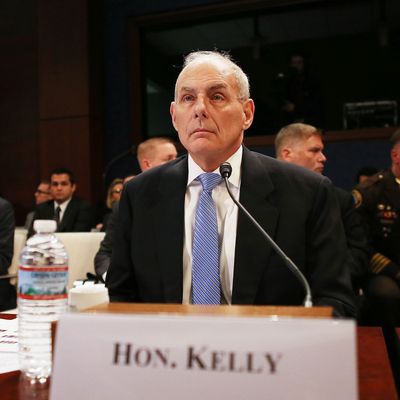
John F. Kelly would like you to know that the clumsy rollout of President Trump’s travel ban was definitely not President Trump’s fault.
“In retrospect, I should have, and this is all on me, by the way, I should have delayed it just a bit,” Trump’s head of DHS told the House Homeland Security Committee. “So I could talk to members of Congress … to prepare them for what was coming.”
As a general rule, with executive orders, the buck stops with the president (who is, after all, the executive). And, in this particular case, it’s rather difficult to see how the hasty implementation of Trump’s travel ban is “all on” Kelly — according to the New York Times, he was in no position to delay the order:
Gen. John F. Kelly, the secretary of homeland security, had dialed in from a Coast Guard plane as he headed back to Washington from Miami. Along with other top officials, he needed guidance from the White House, which had not asked his department for a legal review of the order.
Halfway into the briefing, someone on the call looked up at a television in his office. “The president is signing the executive order that we’re discussing,” the official said, stunned.
Kelly has disputed that story, but the Times sticks by its reporting. Regardless, Kelly didn’t think he or the president had much to apologize for. The DHS secretary predicted that the courts would eventually reinstate the administration’s executive order temporarily barring refugees and visitors from seven Muslim-majority nations from entering the United States. The administration will make its case before three federal judges on the Ninth Circuit Court of Appeals on Tuesday night.
Kelly further suggested that the judges who had stayed the order were guilty of “academic” detachment from the life-or-death realities of national security.
“Of course, in their courtrooms, they’re protected by people like me,” Kelly said.
The secretary testified that it is “entirely possible” that dangerous people are pouring into the country now that the ban has been lifted, as the president has repeatedly claimed.
And it’s true: It is “entirely possible” that a wave of jihadist refugees (who made it through America’s rigorous vetting process) happened to be on the cusp of immigrating when Trump took office — just as it is entirely possible that you will slip and crack your skull the next time you take a shower.
As ten former high-ranking diplomatic and security officials — including former CIA director Leon Panetta, secretaries of State John F. Kerry and Madeleine Albright, and National Security Agency director Michael V. Hayden — said Monday, Trump’s executive order serves “no national security purpose.”
Since the Refugee Act of 1980 established the current regime for vetting applicants, no refugee accepted into the United States has committed a major fatal terrorist attack on U.S. soil, according to an analysis by the Cato Institute. Further, no visa holder from any of the countries on Trump’s blacklist has carried out a fatal terrorist attack in the United States since 1975.
Asked if he could provide evidence that inadequately vetted immigrants were entering the United States, Kelly told the committee, “Not until they act and blow something up, or go into a mall and kill people … We won’t know until then.”
More substantively, Kelly said that he was “at a total loss to understand how we can vet people from various countries when in at least four of those countries we don’t even have embassies,” referring to five of the seven countries on the blacklist as “nearly failed states.”
Nonetheless, Kelly maintained that the travel ban was only temporary, and that no additional countries would be added to the current blacklist.
At other points in the hearing, Kelly tempered the president’s more aggressive proposals for immigration enforcement. The secretary said that the federal government would only cut funding to “sanctuary cities” on a case-by-base basis — and suggested that, even then, the administration would only revoke funds specifically earmarked for immigration enforcement.
“If we are specifically giving grants for cooperation on the removal of illegal aliens and the department or city is no longer doing that, it seems irresponsible to me to continue giving them the money, but it will be case by case,” Kelly said.
The secretary also said that he did not expect to meet Trump’s ambitious hiring goals of 10,000 new Immigration and Customs Enforcement agents and 5,000 U.S. Customs and Border Protection officials within two years.
Finally, while Kelly had told Fox News that Trump’s border wall would be finished within two years, the secretary told Congress that he merely expects its construction to be “well under way” by 2019.
Oh, and the wall may not cover the whole border … and may include stretches of fence. (Much like the border barrier we already have.)






























